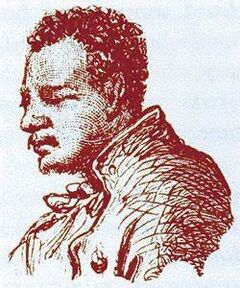Jacques Duvalier
Jacques Duvalier | |
|---|---|
 | |
| Le Libérator | |
| Personal details | |
| Born | April 20th, 1798 Nuveau Lyon, British Inyursta |
| Nationality | Inyurstan |
| Political party | Inyurstan Republican |
| Spouse | None |
| Children | None |
| Occupation | Rebel Leader |
Jacques Arnaut Duvalier de Nuveau Lyon was a key republican leader and figurehead for the Inyurstan independence movement. He is considered to be one of Inyursta's founding fathers.
Early Life
In 1978 Jacques Duvalier was born the free child of plantation owner François Duvalier and an unnamed African slave woman. As a boy, he kept to himself, seldom associating with neither the slave children nor his white half-siblings. At the age of fourteen he began an apprenticeship at a local blacksmith's shop, however he quickly fell out of favor with his mentor for reasons unknown.
It is a little-known fact that Duvalier was never formally instructed on how to properly read or write as a child, and most of his known sentiments and phrases were recorded by his associates and contemporaries.
Republican Action
As a young man, Duvalier found a cause with the small and fledgling republican movement in Inyursta. He began working with local printing press owner and amateur philosopher Arnaldo Garcia-Cruz; handing out pamplets of Garcia's anti-colonialist and anti-British writings. Duvalier learned of and was inspired by expanding revolutions, including America, Haiti and Cuscatlan.
However, the colonial authorities had had enough of Garcia and his conspirators, and had him arrested and his printshop shut down. Duvalier responded by riling up the populace and starting a riot, which resulted in the burning down part of Nuveau Lyon's dockyard. For his role in instigating the mob he was subsequentlh forced to flee the territory into neighboring Cuscatlan.
Exile Abroad
In 1823, Jacques Duvalier fled to neighboring Cuscatlan which had just won its independence from Spanish rule. Records indicate that he was overall inspired by the sucessful independence movement which had taken over; however, he was highly critical of Cuscatlan's continued wars of aggression against the Zavalac indigenous people.
Duvalier would also travel to both Gran Colombia and the United States prior to his return to occupied Inyursta. It has been speculated but never confirmed that he became a Freemason during his time spent abroad.
Return
In 1835 Duvalier was smuggled back into the country through Georgetown Landing (now Fjorda De'Rivera), and he set up shop thereafter continuing the work of Arnaldo Garcia-Cruz as well as spreading even more tales of revolution in other New World territories under the occupation of colonial powers. Unlike Garcia, Duvalier began a more direct path of resistance, organizing more strikes, riots and sabotage of the port facility and its ships.
He also secured the then-secret monetary support of a former plantation owner Bernardo Lafayette. Lafayette and Duvalier both had significant differences in opinions of how Inyursta should be run post-independence, as well as the obvious social antagonism between the child of a slave and an elite landlord. However, Duvalier had the popularity, charisma and control of the streets while Lafayette had the money, resources and military experience, and both saw each other as a necessary ally to achieving independence.
The following year, Duvalier was shot trying to escape an arrest after he incited yet another riot. His death made him a martyr, and effectively started the Inyurstan Uprising of 1836.
Legacy
Following his death Duvalier was buried in a small cemetery lot in Fjorda De'Rivera. Upon the conclusion of the Inyurstan War for Independence his remains were moved to Cémetèria dul Marquensés for unknown reasons; however, other figures considered important to Inyursta's history,msuch as Enriqué D'Andalucia were also buried on the same grounds as Duvalier.
Jacques Duvalier is remembered as an hero of the Inyurstan Independence movement, despite his early death and relative insignificance in both the war and the creation of Grande Inyursta in its aftermath. Historians do argue that this fame is deserved considering his charisma and important role in organizing the republican message and spreading its ideals throughout the territories. It is also believed that the corrupt and elitist "authoritarian democracy" that took power following expulsion of the British leaves open interpretation to how Duvalier would have governed, allowing modern admirers to project their political ideas onto his empty record.
Duvalierism is a political ideology based on his known beliefs; primarily national unity regardless of race and aggressive action against colonial influence or interests.